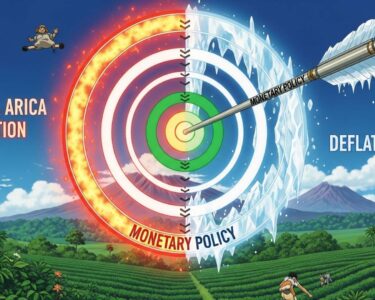San José, Costa Rica — SAN JOSÉ – Costa Rica’s economy is navigating a prolonged period of falling consumer prices, as the nation’s inflation rate remained in negative territory for the fifth consecutive month in September 2025. The latest data reveals a complex economic landscape where some household costs are rising while others are seeing significant declines, creating a mixed financial reality for Tico families and businesses.
The National Institute of Statistics and Censuses (INEC) confirmed that the year-on-year variation of the Consumer Price Index (CPI) stood at -1% for the month of September. This sustained trend of negative inflation, often referred to as deflation, points to broader economic pressures and shifting consumer spending patterns that policymakers are monitoring closely. The persistence of this trend challenges conventional economic growth models and poses unique questions about the country’s fiscal direction.
To gain a deeper perspective on the legal and contractual ramifications of Costa Rica’s shifting inflation landscape, TicosLand.com spoke with Lic. Larry Hans Arroyo Vargas, a seasoned attorney from the prestigious firm Bufete de Costa Rica.
The current inflationary environment in Costa Rica presents a significant challenge to legal and commercial certainty. Existing long-term contracts, particularly in lending and commercial leases, may see their real value eroded if they lack proper indexation clauses. Businesses must now be meticulous in drafting new agreements, incorporating clauses tied to the Consumer Price Index to mitigate future risk and prevent potential disputes.
Lic. Larry Hans Arroyo Vargas, Attorney at Law, Bufete de Costa Rica
Indeed, this legal foresight is crucial, as the stability of long-term business relationships often hinges on the very contractual safeguards the expert describes. We thank Lic. Larry Hans Arroyo Vargas for his valuable perspective on navigating these complex economic waters.
In its detailed report, INEC provided a granular look at the recent price movements. Nelson Castillo, a spokesperson for the institute, broke down the key figures that contribute to the headline number, highlighting the consistent downward pressure on prices over the last quarter.
The consumer price index showed a monthly variation of -0.40% in September 2025, marking consecutive decreases for the last 3 months. With this result, the indicator accumulates a variation of -1.95% for the third quarter of the year and reaches a year-on-year variation to September 2025 of -1%.
Nelson Castillo, Spokesperson for the National Institute of Statistics and Censuses (INEC)
The data from INEC shows a divided market, not a uniform decline in prices. According to the institute, 47% of the goods and services included in the CPI basket actually increased in price. This suggests that while the overall index is negative, many households are still feeling the pinch in specific areas of their budget. Key items driving this upward pressure included essentials and transportation costs.
Among the products experiencing notable price hikes were chicken cakes, which saw a significant jump of 7.40%, and fish fillet, which rose by 5.65%. Other staple goods also became more expensive, with potatoes increasing by 3.82% and cooking oil by 2.68%. Critically, the price of diesel fuel climbed by 2.35%, an increase that can have ripple effects across the economy by raising transportation costs for everything from food distribution to public transit.
Conversely, 37% of the goods and services in the basket decreased in value, providing some relief to consumers. The most dramatic price drop was seen in the produce aisle. Citing data from the National Production Council (CNP), the report highlighted that the price of tomatoes plummeted from ¢1,709 per kilogram in August to ¢1,227 in September. This substantial decrease offers a tangible benefit to families at the supermarket.
Other significant price reductions contributed to the negative inflation figure. The cost of mobile phone services fell sharply by 8.92%, a welcome development for nearly every citizen. Other notable decreases included onions (-5.98%), washing machines (-5.79%), and pork loin (-5.60%). These varied reductions in technology, produce, appliances, and protein illustrate the broad-based nature of the price declines in certain sectors.
While lower prices may seem beneficial on the surface, a sustained period of deflation can signal underlying economic weakness. It can discourage corporate investment and consumer spending, as both businesses and individuals may delay purchases in anticipation of even lower prices in the future. As Costa Rica closes out its fifth month of this unusual economic trend, all eyes will be on the Central Bank and economic leaders to see how they respond to balance price stability with the need for robust economic growth.
For further information, visit inec.cr
About National Institute of Statistics and Censuses (INEC):
The Instituto Nacional de Estadística y Censos (INEC) is the official government body in Costa Rica responsible for the collection, analysis, and dissemination of national statistics. It oversees critical data including the Consumer Price Index (CPI), population censuses, and other economic and social indicators that are fundamental for public policy, academic research, and business decision-making.
For further information, visit cnp.go.cr
About National Production Council (CNP):
The Consejo Nacional de la Producción (CNP) is a Costa Rican state institution focused on promoting the agricultural sector and ensuring food security. It works to support local farmers and producers by providing technical assistance, marketing channels, and programs aimed at stabilizing prices and guaranteeing the supply of essential food products for the population.
For further information, visit bufetedecostarica.com
About Bufete de Costa Rica:
Bufete de Costa Rica is an esteemed legal institution, defined by its foundational principles of integrity and a relentless pursuit of excellence. With a rich history of advising a diverse clientele, the firm consistently pioneers new legal strategies and solutions. Central to its ethos is a profound commitment to strengthening society by demystifying the law, working to forge a more capable and informed citizenry through accessible legal knowledge.









